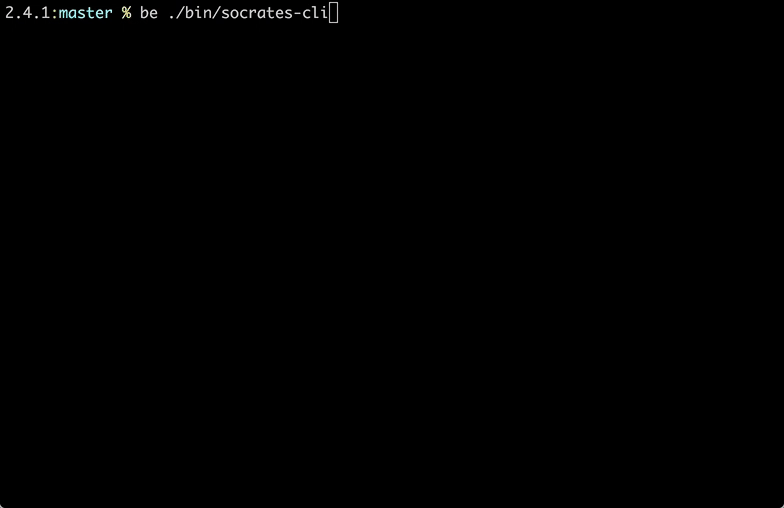Socrates
Socrates is a micro-framework for building stateful conversational interfaces. It provides straight-forward state management, a clear pattern for modeling the states and conversational flow (transitions), and some helpers.
It's designed for building conversational Slack bots, but is designed in such a way that other adapters could be written. It ships with a Console adapter for testing locally in the terminal as well as a Memory adapter for use in automated tests.
Disclaimer: This framework is still in its early stages. It's been used for one production bot for the last year or so, but might see some changes as other folks use it and provide feedback.
Conceptually, a conversation is a sequence of asking and listening actions. As a conversation progresses, information is gathered and at some point, acted upon by the system.
Conversational state is captured either in memory (development and testing) or in Redis. This too is pluggable so that other storage backends could be used.
Here is a simple example, asking for one's name, birth date, and then responding with the current age.
class GetStarted
include Socrates::Core::State
def listen(message)
case message.downcase
when "help"
transition_to :help
when "age"
transition_to :ask_for_name
else
transition_to :no_comprende
end
end
end
class Help
include Socrates::Core::State
def ask
respond message: <<~MSG
Thanks for asking! I can do these things for you...
• `age` - Calculate your age from your birth date.
• `help` - Tell you what I can do for you.
So, what shall it be?
MSG
transition_to :get_started, action: :listen
end
end
class NoComprende
include Socrates::Core::State
def ask
respond message: "Whoops, I don't know what you mean by that. Try `help` to see my commands."
transition_to :get_started
end
end
class AskForName
include Socrates::Core::State
def ask
respond message: "First things first, what's your name?"
end
def listen(message)
# Transition to the next step while persisting the name for future retrieval.
transition_to :ask_for_birth_date, data: { name: message }
end
end
class AskForBirthDate
include Socrates::Core::State
def ask
respond message: "Hi #{first_name}! What's your birth date (e.g. MM/DD/YYYY)?"
end
def listen(message)
begin
birth_date = Date.strptime(message, "%m/%d/%Y")
rescue ArgumentError
respond message: "Whoops, I didn't understand that. What's your birth date (e.g. MM/DD/YYYY)?"
repeat_action
return
end
# Transition to the next step while persisting the birth date for future retrieval.
transition_to :calculate_age, data: { birth_date: birth_date }
end
private
def first_name
@data.get(:name).split.first
end
end
class CalculateAge
include Socrates::Core::State
def ask
respond message: "Got it #{first_name}! So that makes you #{calculate_age} years old."
end_conversation
end
private
def first_name
@data.get(:name).split.first
end
def birth_date
@data.get(:birth_date)
end
def calculate_age
((Date.today.to_time - birth_date.to_time) / 1.year).floor
end
endInstallation
Add this line to your application's Gemfile:
gem 'socrates'And then execute:
$ bundle
Or install it yourself as:
$ gem install socrates
Usage
Socrates is intended to be used programmatically from your application.
However, it's easy to see a sample conversation run in either the console or on Slack.
To see socrates in action in the console:
$ socrates run
And on Slack:
$ SLACK_API_TOKEN=<your token> socrates -a slack run
Use -s redis to store state in Redis instead of memory. The key difference is that state will survive exiting and
restarting the bot. Use the -d flag for debugging log information.
Core Concepts
- Dispatcher - Kicks off conversations, responds to input, and provides general state managements.
- Session - Buffers messages to channels, until flushed by an Adapter.
- Adapter (Slack, Console, Memory) - Captures service specific functionality.
- Storage (Memory, Redis) - Handles persisting conversational state.
- State - Represents a state of a conversation, provides helpers for state implementations.
- Helpers - Simple helpers.
TODO: Expand descriptions. Include a diagram.
Development
After checking out the repo, run bin/setup to install dependencies. Then, run rake to run the specs and rubocop. You can also run bin/console for an interactive prompt that will allow you to experiment.
To install this gem onto your local machine, run bundle exec rake install. To release a new version, update the version number in version.rb, and then run bundle exec rake release, which will create a git tag for the version, push git commits and tags, and push the .gem file to rubygems.org.
Contributing
Bug reports and pull requests are welcome on GitHub at https://github.com/carbonfive/socrates.
